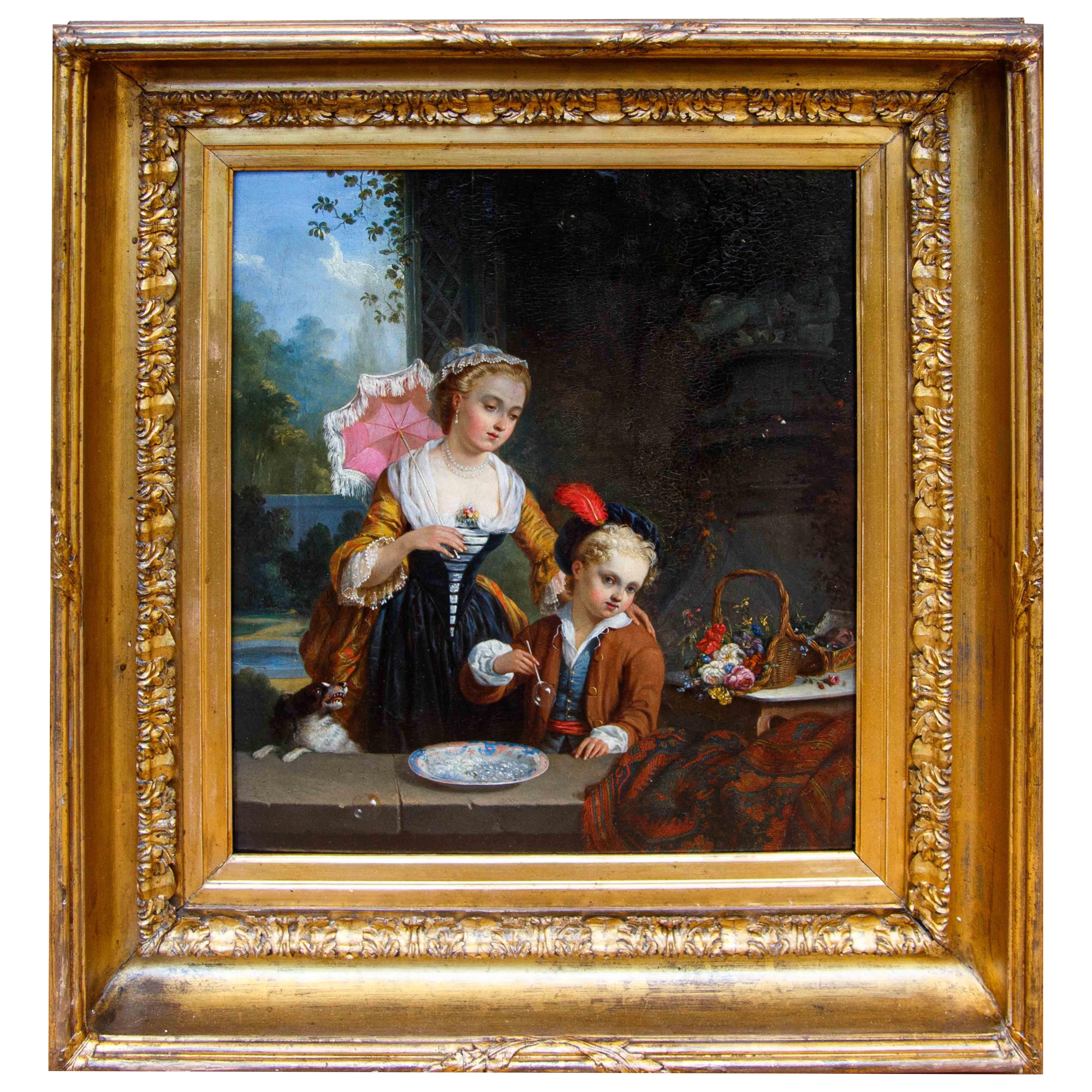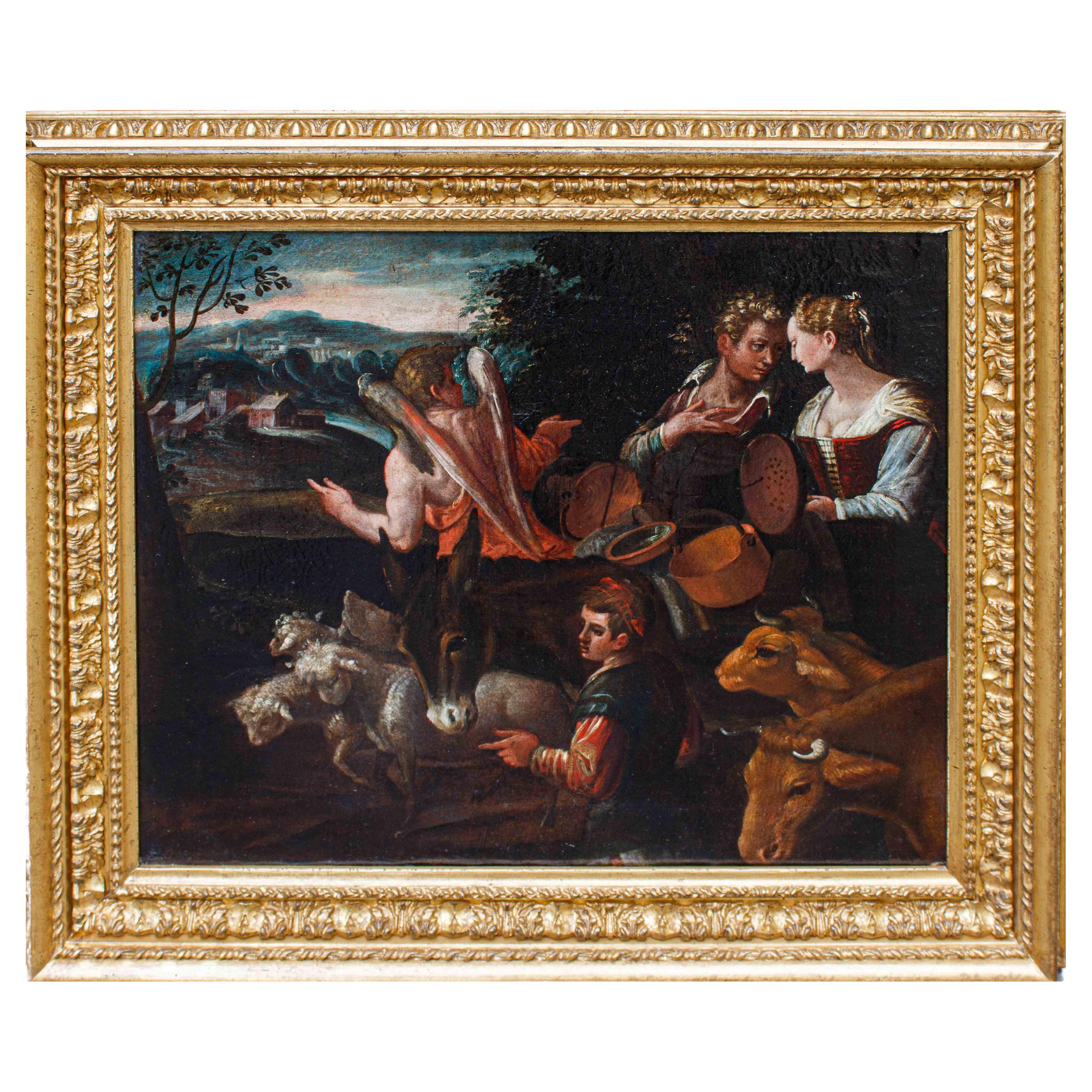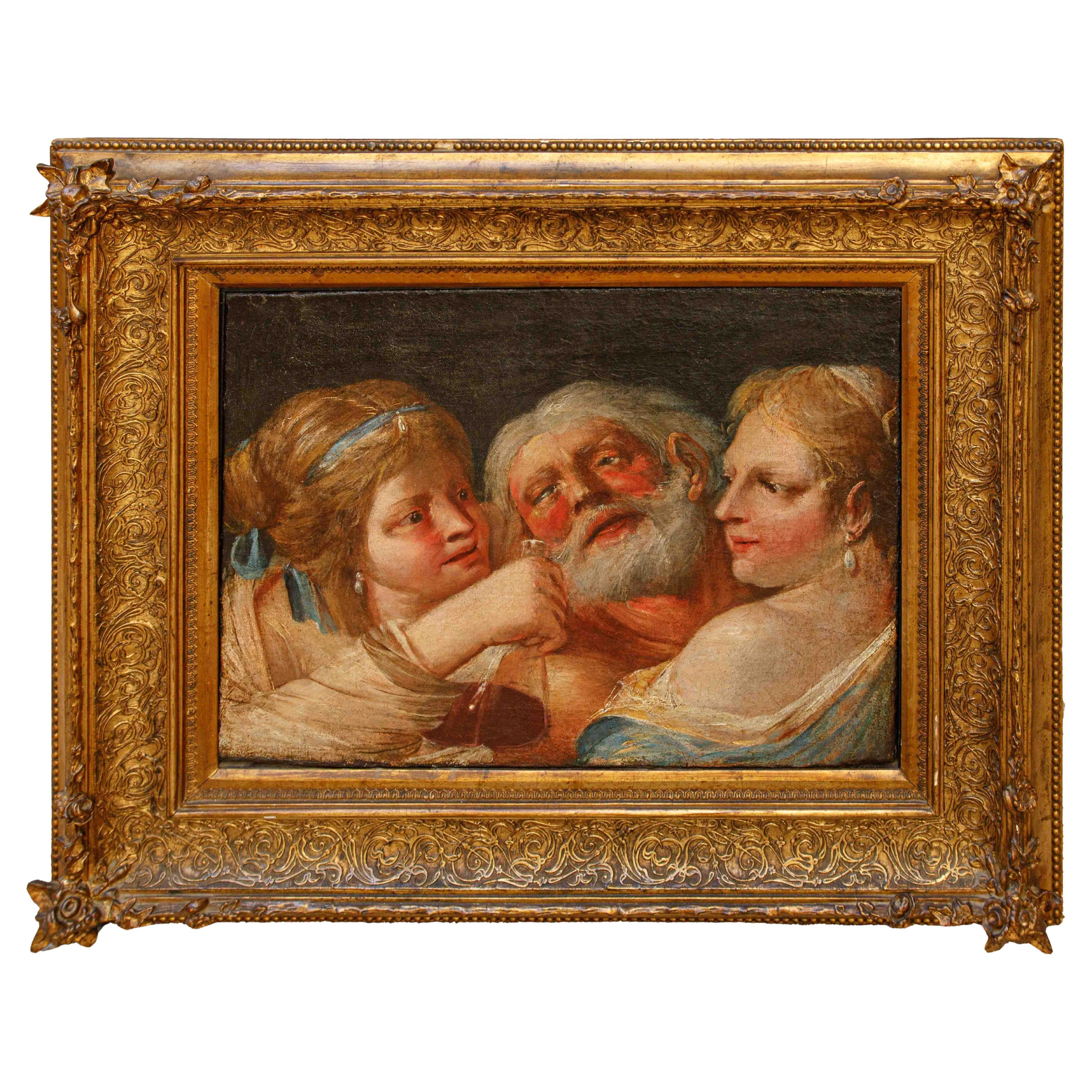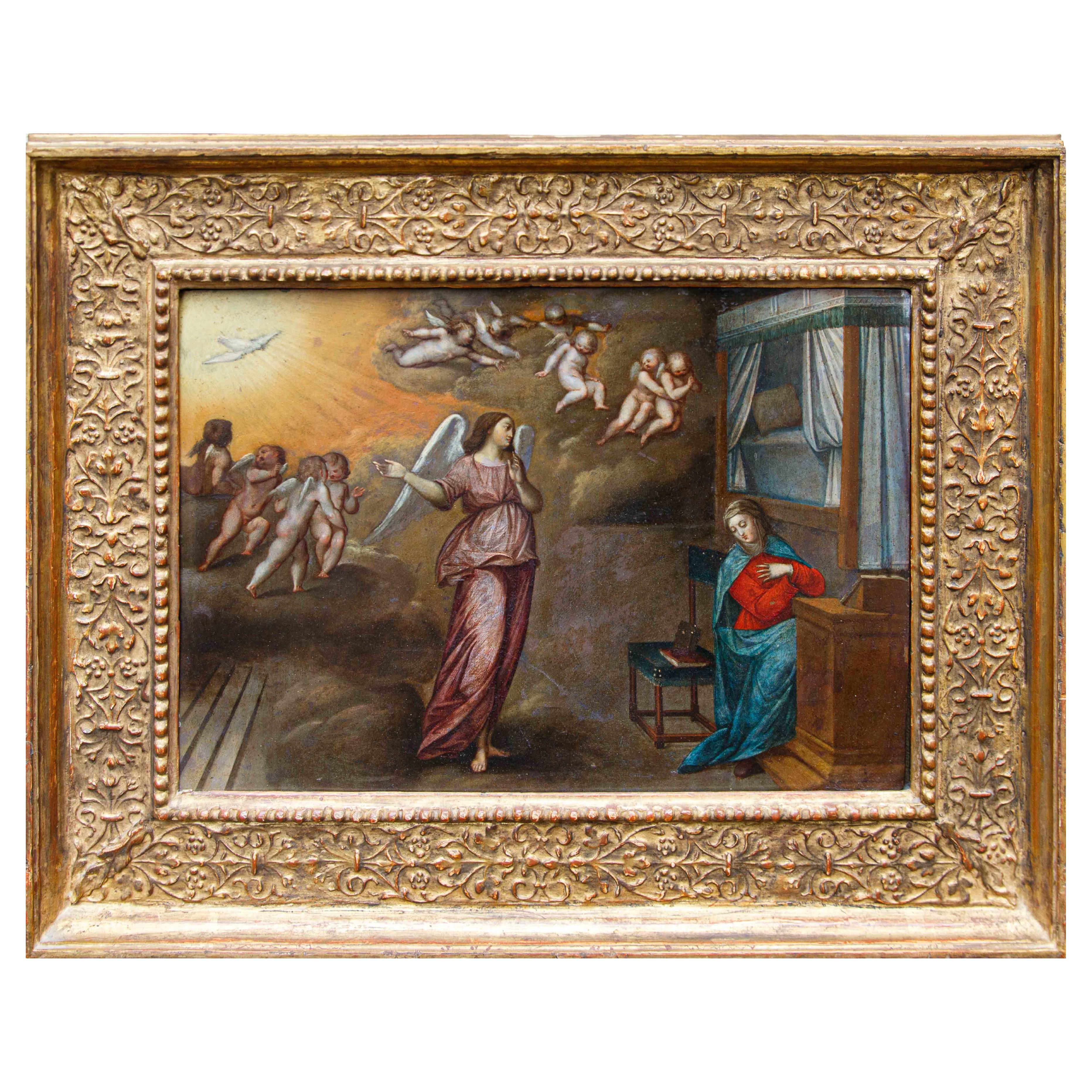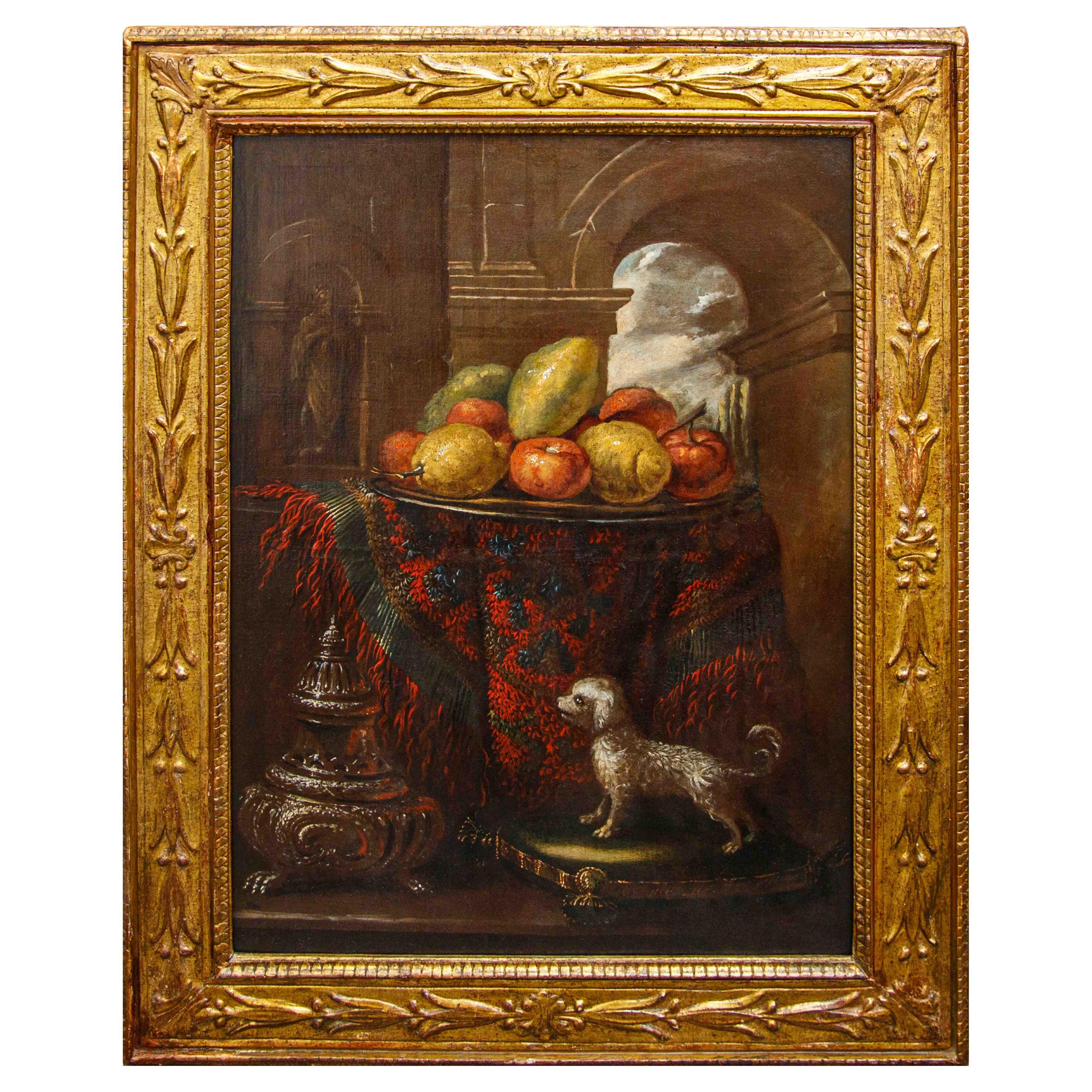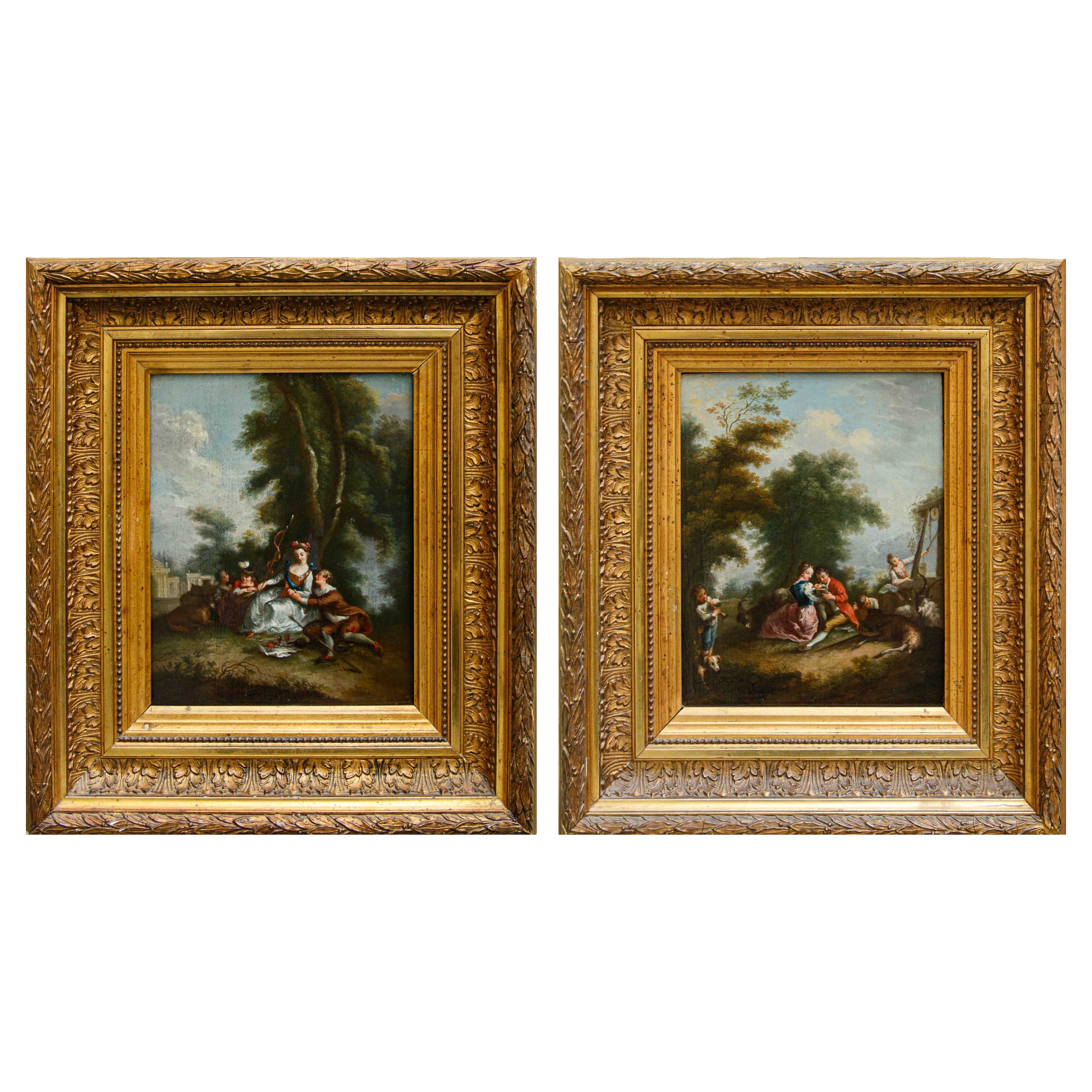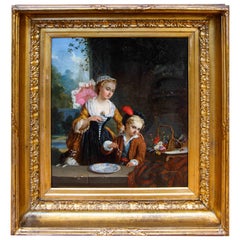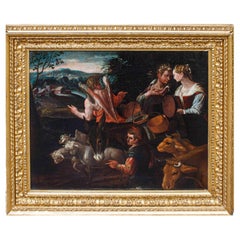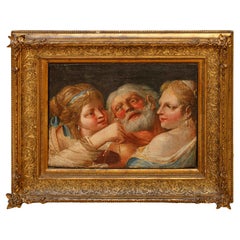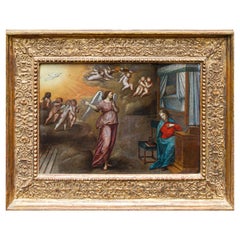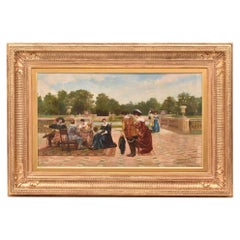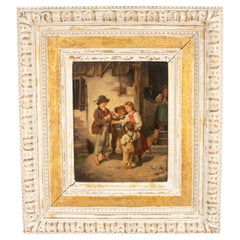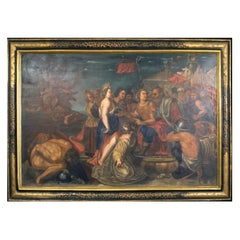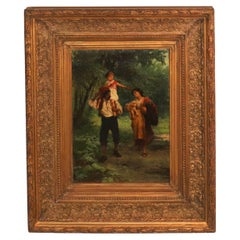Items Similar to French School, 20th century, Three Brothers
Want more images or videos?
Request additional images or videos from the seller
1 of 14
French School, 20th century, Three Brothers
$4,077.21
£3,033.03
€3,400
CA$5,583.09
A$6,207.64
CHF 3,241.29
MX$75,562.09
NOK 41,357.41
SEK 38,749.91
DKK 25,882.32
Shipping
Retrieving quote...The 1stDibs Promise:
Authenticity Guarantee,
Money-Back Guarantee,
24-Hour Cancellation
About the Item
French School, 20th century
Three brothers
Pastel on paper, 77 x 108 cm
Framed, 101 x 134 cm
Signed and dated lower right "Ducreux 1903"
The crayon in question depicts three children around a table, intent on playing cards. In the center, a little girl with long red hair and a white bow wears a light-colored dress with an elegant floral decoration at chest level. To her left, a red-haired child, dressed in a dark suit with an elaborate lace collar, looks at her in profile. To his right, another tawny-haired child, wearing a dark suit and light collar, looks toward the observer with a slight, tender smile.
The pastel, made in the French area in 1903 by the painter Ducreux, about whom we have no biographical information, shows several similarities with the late production of various members of the Impressionist circle, recalling, in particular the mature activity of Pierre-Auguste Renoir. Renoir, an emblematic figure of Impressionism, is universally recognized for his oil paintings, particularly his vibrant portraits and scenes of Parisian life. However, the painter, especially in the second segment of his career, also explored with remarkable skill the technique of pastel, a medium that offered him unique expressive possibilities complementary to his oil painting. Renoir's interest in pastel developed from the mid-1880s, a time when other Impressionist artists such as Manet and Degas were already experimenting with the technique. Unlike his drawings, which he rarely exhibited, Renoir considered his pastels an essential part of his artistic output and frequently showed them to the public. Pastel, by its nature, allows for great speed of execution. Renoir exploited this quality to capture the vividness of expressions, the "quickness of the flash of intelligence," and the "fleeting displays of emotion" of his subjects, often friends, family members, and especially young women and children. This immediacy aligned perfectly with the Impressionist aesthetic, which aimed to capture the fleeting moment. Pastels, with their dusty nature and pure colors, also allowed for light and delicate effects that were difficult to replicate with oil. He was particularly adept at rendering the transparency of youthful complexions and the softness of textures. Pastel offers a bridge between drawing and painting. Renoir used this feature to combine the strength of line with the richness of color, creating works that combined the precision of contour with striking color gradients.
Many of the characteristics of Renoir's pastel works are found in this paper: the colored pencils allow the painter to best render the details of the physiognomies of the portrayed, the brightness of their complexions
- Dimensions:Height: 42.52 in (108 cm)Width: 30.32 in (77 cm)Depth: 3.15 in (8 cm)
- Style:Other (Of the Period)
- Materials and Techniques:Paper,Other
- Place of Origin:
- Period:
- Date of Manufacture:1903
- Condition:Wear consistent with age and use.
- Seller Location:Milan, IT
- Reference Number:1stDibs: LU5918245953602

About the Seller
5.0
Vetted Professional Seller
Every seller passes strict standards for authenticity and reliability
Established in 2000
1stDibs seller since 2021
30 sales on 1stDibs
- ShippingRetrieving quote...Shipping from: Milan, Italy
- Return Policy
Authenticity Guarantee
In the unlikely event there’s an issue with an item’s authenticity, contact us within 1 year for a full refund. DetailsMoney-Back Guarantee
If your item is not as described, is damaged in transit, or does not arrive, contact us within 7 days for a full refund. Details24-Hour Cancellation
You have a 24-hour grace period in which to reconsider your purchase, with no questions asked.Vetted Professional Sellers
Our world-class sellers must adhere to strict standards for service and quality, maintaining the integrity of our listings.Price-Match Guarantee
If you find that a seller listed the same item for a lower price elsewhere, we’ll match it.Trusted Global Delivery
Our best-in-class carrier network provides specialized shipping options worldwide, including custom delivery.More From This Seller
View All18th-19th century, French school, the soap bubbles
Located in Milan, IT
French school, 18th-19th century
The soap bubbles
Oil on panel, 44.5 x 36.5 cm
Framed, 60 x 54 cm
In this French school painting, with its leery and playful tone, but mother lovi...
Category
Antique 19th Century Other Paintings
Materials
Canvas
Venetian school, Tobias and Sara in Nineveh, oil on canvas, 16th century
Located in Milan, IT
Venetian School, second half of the 16th century
Tobiah and Sarah led to Nineveh by the archangel Azariah
Oil on canvas, 48 x 56 cm - Framed, 58 x 72 cm
The present canvas, made w...
Category
Antique 16th Century Paintings
Materials
Canvas
Venetian school, mid-18th century, Loth and daughters
Located in Milan, IT
Venetian school, mid-18th century
Loth and the daughters
Oil on canvas, 43 x 57 cm
Framed, 70 x 84 cm
The canvas under consideration clearly depicts Loth and his daughters, the p...
Category
Antique 18th Century and Earlier Italian Other Paintings
Materials
Canvas
Flemish school, 17th century, Annunciation
Located in Milan, IT
Flemish school, 17th century
Annunciation
Oil on copper, 28 x 40.5 cm
Framed, 45 x 57 cm
Category
Antique 18th Century and Earlier Dutch Other Paintings
Materials
Canvas
Roman school, second half of the 17th century, Composition with lemons and small dog
Located in Milan, IT
Roman school, second half of the 17th century
Composition with lemons and small dog
Oil on canvas, 97.5 x 74.5 cm
Framed, 120 x 95 cm
The work we describe here can be framed in t...
Category
Antique 18th Century and Earlier Italian Other Paintings
Materials
Canvas
18th century, French School, Gallant scenes
Located in Milan, IT
18th century, French School
Gallant Scenes
(2) Oil on panel, 24 x 19 cm
Framed, 44 x 36 cm
This pair of works attributable to the artistic context of the French eighteenth centu...
Category
Antique 18th Century and Earlier Italian Other Paintings
Materials
Wood
You May Also Like
Antique Painting, Noble Elegant Dresses, Filippo Baratti, Oil On Canvas, 19th.
Located in Breganze, VI
The antique paintings category features a Beautiful Portrait of a Group of Elegantly Dressed People
while in a park playing a game of chess, an oil painting on canvas,
of the Seco...
Category
Antique Late 19th Century French Napoleon III Paintings
Materials
Canvas
Early 19th Century Belgian Oil on Panel by André Collin
Located in Chicago, IL
This charming turn-of-the-century oil painting on a wooden panel by André Collin depicts a group of four children gathered at the foot of stairs, feeding a young bird. In a masterful...
Category
Antique 19th Century Belgian Victorian Paintings
Materials
Wood, Paint
Large historical painting 18th century, Italian school
Located in Cesena, FC
Large historical painting 18th century, Italian school
"Darius' mother pleading before Alexander after the battle of Issus."
Oil on canvas 210 x 290 cm
Painted with great strength...
Category
Antique Late 18th Century Italian Paintings
Materials
Canvas, Wood, Giltwood
19th Century Italian Painting by Leopoldina Zanetti Borzino (Italian 1826-1902)
Located in Chicago, IL
Leopoldina Zanetti Borzino (Italian 1826-1902). Born in Venice, Leopoldina was the niece of Daniel Manin, a hero statesman, who would become the President of San Marco, a revolutiona...
Category
Antique Mid-19th Century Italian Other Paintings
Materials
Gesso, Wood, Canvas
$10,800 Sale Price
20% Off
19th Century Oil On Mahogany Board by William M Hensley (British 1819-1883)
Located in Chicago, IL
This 19th-century oil on mahogany board titled 'The Cut Finger' by William Hemsley, R.B.A., depicts a familial pairing in a cottage home. The girl tends to the eponymous cut with a white cloth pressed on the boy's finger. A dim light is cast from the window to the left, illuminating a cut loaf of bread, a knife, and simple stoneware to set the scene. The girl sits in a wooden chair wearing a salmon-colored blouse, while the young boy is dressed in a golden overshirt.
William Hemsley, R.B.A., (1819-1906) was a prolific draughtsman and painter of genre scenes depicting English provincial life. Hemsley’s scenes of everyday reality, which were usually painted on a small scale, follow the gentle tradition of Webster and F. D. Hardy. He was, like them, fond of painting children at play. Many of his works depicted rustic domestic scenes, leading to him being described as "pre-eminently the painter of cottage life". He was also a member of the Society of British Artists. He exhibited frequently in London, particularly at the Royal Academy and the Suffolk Street Gallery.
This gentle painting faithfully represents a moment between two people caring for one another. Hemsley painted in a style reminiscent of earlier golden-age Dutch genre painting, using light and color in a vibrant but elegant manner—signature on the lower left-hand corner.
In the 19th century, it was common to paint on wood due to its durability, smooth surface, and long-standing tradition. Wood panels were preferred for their sturdiness and versatility, suitable for detailed artworks and various shapes and sizes. While wood was popular, especially for smaller works, canvas started gaining popularity later in the century for its lighter weight and ease of use.
This rustic genre scene resides in an ornate Louis XIV Régence style convex frame with foliate shell cartouche corners, strap work, and c-scrolls on a cross-hatched ground with white pigment dispersed throughout. In the early 18th century the Louis XIV styles blended into the Régence frame style (c.1715-1723) which placed greater emphasis on the corners and centers. The full Regency style was both opulent and delicate, with the order and linearity of this period giving way to the swirling delicacy of the Rococo.
This painting would be a wonderful addition to a home office, entryway, or library...
Category
Antique 19th Century English Victorian Paintings
Materials
Mahogany, Oak, Paint
19th Century Painting jules arsene garnier
Located in Esbeek, NL
Jules-Arsène Garnier (1847–1889) was a French painter known for his historical and genre works. Born in Paris, he began his education at the Académie de Toulouse, one of the most pre...
Category
Antique 19th Century Paintings
Materials
Wood
$7,195 / set
